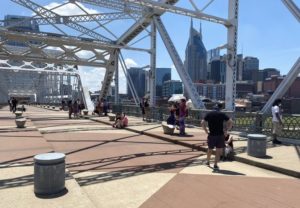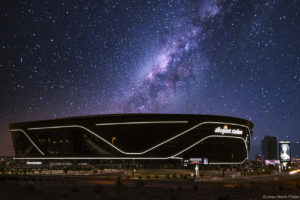
A new Tennessee Titans stadium will cost an estimated $2 billion with half coming from taxpayers. Residents and visitors are mixed on the idea, but economists call it a bad deal.
It was a sunny day outside of Nissan Stadium, and walking over the John Seigenthaler Pedestrian Bridge were Edward and Eddie Cowan, who are both stoked about the idea of a new Titans stadium.
 Damon Mitchell WPLN News
Damon Mitchell WPLN NewsJohn Seigenthaler Pedestrian Bridge in downtown Nashville
“I want it to be a dome. I want it to be, like, a real dome,” Edward said.
“I just want us to win,” said Eddie.
“Yeah, I want us to win too,” Edward added, “but you know make us look fancy, make us look like something.”
While winning isn’t promised, the dome is. The Tennessee General Assembly has promised $500 million, while Nashville is expected to pitch in $700 million for the build. But the state will only fork it over if the new stadium has a dome and a minimum of 50,000 seats.
While the Cowan brothers are excited, Pat Garofalo says it’s not really a smart use of taxpayer dollars. Garofalo is director for state and local policy for a public subsidy watchdog called the American Economic Liberties Project.
“Stadiums simply do not do what they are supposed to do in terms of providing economic benefit to the community on any metric that we actually care about,” Garofalo said. “Good jobs, sustainable income, sustainable tax revenue — stadiums just fail.”
 h2kyaks
h2kyaks Allegiant Stadium in Las Vegas, NV.
Garofalo says using public funds to finance new stadiums is not a new trend. The city of Las Vegas approved $750 million to entice the Raiders to relocate from Oakland.
“The same kind of goofy idea that Las Vegas needed a football stadium to attract visitors because nobody was going to Las Vegas. And it’s just, like, they put tons of money into it. I don’t think there’s any evidence that it actually paid off in any real way for the citizens.”
Barry Bright, who lives in the Hillsboro neighborhood, agrees the money could be put to better use. He was riding his bike outside the stadium, which was built in 1999.
“I swear to God, there are so many potholes in this city. And I’m like, ‘Can we just use those funds to take care of the infrastructure and things that need to be done? Things that are little more important, Iike schools,” Bright said. “I think a stadium is the last of our concerns.”
Michael Leeds, who specializes in sports economics at Temple University, says buying a new stadium is more like buying a present.
“If Nashville wants to buy itself a stadium to make itself happy that’s great, and it should do it,” Leeds said. “But it shouldn’t kid itself and say this is going to be for the betterment of our residents.”
The deal is not yet finalized, but estimates shared with the state show it’s expected to be ready by the 2026 NFL season. The Titans had initially explored renovating the stadium but decided it was too costly.
Even tourists aren’t sure it’s a good deal. Husband and wife, Buddy and Sandy Bettencourt, were recently visiting from Springfield, Missouri.
Buddy is such a die-hard Raiders fan, who has a tattoo of their original logo on his leg. That tattoo shows his commitment to the team. But he says fandom shouldn’t come with such a steep price tag.
“A billion dollars is a lot of money to spend, and you’re looking at two here. It’s a lot of money, and what’s wrong with this one?” Buddy said.
On the other hand, Sandy sees potential benefits.
“I actually probably am less cautious than him because I see it as it’s a $2 billion stadium, but it brings how many thousands of jobs,” she said.
Experts like Leeds and Garofalo say these jobs aren’t high-paying or long-lasting. If Nashville follows through with its commitment, it’ll be one of the largest public subsidies for a stadium yet.
Correction: This story originally identified Pat Garafolo as an economist. He is director of state and local policy for a nonprofit that tracks public subsidies.

